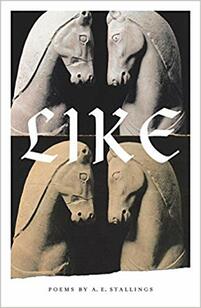 Reviewed by Gwen Hart In her fourth poetry collection, Like (Farrar, Straus, Giroux, 2018), A. E Stallings uses her mastery of poetic forms to explore subjects as diverse as language use, current events, and the weight of loss. The title poem, “Like: the Sestina,” is an unusual twist on the sestina form. Usually, a sestina has six end words that alternate in a prescribed pattern (e.g., see Tyler Van Swol’s “Bear Down: A Sestina” and Grant Lenz’s “The Show Goes On” in the third issue of Hot Dish Magazine). Stallings’ sestina, however, uses some variation of like for every end-word in the poem: like, dislike, alike, look-alike, unlike, money-like, I’m like, he’s like, etc.). The acrobatic uses of like are delightful and surprising, even while highlighting what “real speech is like,” as Stallings writes. Stallings also takes on current events with several powerful poems about the plight of refugees. In “Empathy,” Stallings compares the life of a middle class family to that of a family of refugees setting out on a dangerous journey across water without proper equipment, their “cheap life jackets / No better than bright orange trash.” The contrast between the two families is striking, and the startling ending of the poem cuts right to the heart. The multipart poem “Refugee Fugue” fleshes out the issue even more. The poem contrasts scenes and perspectives, from children on holiday “making their sandy town” of sand castles while “Small bodies” of immigrant children “wash ashore, / Sea-chewed, a few days dead.” Each section of the poem takes on a different form—heroic couplet, rhymed quatrain, list, and so on—emphasizing the many voices represented across the sections. In a tour-de-force multi-part poem in the middle of the book, “Lost and Found” (linked to here in Beloit Poetry Journal), Stallings describes a mother’s dream journey through “the valley of the moon /where everything misplaced on earth accrues,” from the houses of long-dead grandparents, “letters / we meant to write,” lost hours of sleep, faded beauty, and much more. I heard her read this poem at West Chester University’s Form and Narrative Conference, and the audience was held in thrall at the imagery—and the poignant ending, which I will not ruin here. In conclusion, anyone who enjoys poetic form, or who is simply interested in the best of today’s poetry, will be well rewarded with a trip through A. E. Stallings’ Like.
0 Comments
Leave a Reply. |
Archives
April 2021
Categories |
- Home
- About
-
Issues
-
2024 cover page
>
- Editors' Note (2024)
- Fifty-two Minutes
- The Day I Love Myself More Than You
- Shadows
- Bloodlust: The Metamorphosis
- picture this
- rite of passage
- Bathroom Floor
- Cat
- M
- 삼년상 (Sam-Nyun-Sang)
- Valley
- I'm More Than
- I'm Not a Toy
- Rising Phoenix
- Grow
- Canvas
- red :3
- Green Cousins
- The Lighthouse
- Sea of Plants/Planets
- Kitty's Poem
- Fin
- tomie
- Library Class
- Our Lie
- Weavers
- An Old Tree
- A World Without You
- All Must Die
- Flower
- The Canoe
- It's Scary Up Here
- Beautiful Things
- Ma Vie
- The Final Wall
- Hosts
- Waqe Zhiga
- two faced feelings
- imposter syndrome
- Feminism
- Pretty Girls
- It's Just Us
-
See You in Another World (2023)
>
- Editors' Note (2023)
- Voices of the Summer Night
- Lightning Glut
- All The Little Things
- From a Distance
- Confined
- The Night Hours
- A Contrapuntal for the Girl in My Dreams
- Go Back (before they do)
- Snippet of Thought
- The Darkness
- Her Nature
- I Listen
- Stranger In The City
- What Music Does
- Fallen Stranger
- The Black Dress
-
A Fire of Words (2022)
>
- Editors' Note (2022)
- The Floor Wallows Lower
- Cornflowers
- Erudite
- That One Morning
- mom, im afraid
- selenophilia
- Roses and Rainbows
- If a poisonous snake bites itself, will it die?
- Rochester
- Crown of Branches
- Stairs to the Sea
- A Poem Written Entirely From Advertisements
- Pyromania
- silhouette of a bird against winter stars
- thunderstorm in the bedroom
- A Night in Recovery
- sleeping gypsie
- paper dolls&goodbyes
- We Are Women
- Village Air
- Sunshine's Laughter
- the male gaze
- The Forensic Entomologist
- Lacking
- Drowning
- Adelie
-
Create the Wonders We Dream (2021)
>
- Editors' Note (2021)
- Zove
- I'm Sorry
- Fake Smile
- My Friend the Balloon
- Eyes Intertwined
- Perfect
- Only a Moment
- A Dangerous Word
- My Dreams
- The Last 100 Meters
- The Green Void (Villanelle)
- The Whimsical Galaxy (Sestina)
- The Silent Kindness
- Pressure
- Table on the Hill
- The Yukon
- The Shore
- Repentance
- Her and I
- Infections of the Soul
- Threads
- Dream of a High Schooler
- Empty
- little flame
- scars
- black and white
- The Cat
- Joy
- Sweet Honey Bee Stings
- If There Were One Day
- Delete
- Our Hearts to Central Vietnam
- him or Him?
- Ocean
- Es Llaner Beach
- Sewn Together
- Rain
- Yes, I Like
- The Legacy of the Moon
- The Wind Whimpers
- From Here I See
- To Feel Clean
- Red
- Survival
- Substance
- Golden Lies
- Midnight Tango
- Ode to a Spleen
- Modern Siren
- The Night's Diamond Tears
- Beats In Double Time
- A Day in the Flight
- Carved By Venus
- Lifeline
- Everest
- Education
- How Much of Reality Can Be Observed
- What is a Spork
- What is the difference between love and in love
- What would you have wanted? me to say
- Planet Caravan
- The Journey of a Minute
- The Circus of Scars
- Mosaic
- Color
- Love and Acceptance
-
Colors I Never Knew Existed (2020)
>
- Editors' Note (2020)
- Two Weeks' Notice
- A Curious Man
- An Eternity Swathed in Cobwebs
- Hidden Memories: A Villanelle
- A Better Place
- Conscription
- Just Breathe
- Akko
- The Hungry Dark
- And Then Something Shuffled
- Deodorants are a Girl's Best Friend
- The Old House
- Willow
- Perfection
- She Will Be Queen
- Nothing But Space
- a wicked thing
- Anthony
- Cheesecake
- Za
- Coco
- Coexist
- der böse Mann
- Feeding
- Catharsis
- I HAD TO RENAME THIS POEM DUE TO COPYRIGHT ISSUES
- For All The Kids Who Were Told They'd Never Make It... and Believed This
- i Will Always Love You
- Our 4
- Rainy Day
- Space
- The Ocean Cares Nothing of Man
- Sickly Sweet Love
- I call the eating disorder hotline
- Bright and Sunny Day
- Grandma in the Moon
- Interminable Education in Seventeen Syllables
- Macrocosmic Creation
- Middle Class Psyche
- My Sister
- From a Park Bench
- Rain
- A Recollection of Our Memories
- Sadie Got Me in My Feelings
- Uranium Rose
- When I Grow Up - Paige Rhoads
- Who am I?
- 49-53
-
Words Become Reality (2019)
>
- Editors' Note (2019)
- Bear Down: A Sestina
- Kidnapped & Killed
- Lemonade
- Rise
- Someone Who always Pays
- A Simple Story
- The King's Battle
- Aftermath
- Aging Population
- Can we still be friends?
- Carpe Diem
- Coffee
- Day to Day
- Do Not Hold me Closer, Let me Go
- Gift of Time
- Love Everlasting
- A Message to the Youth
- Peach
- Waiting for the Bell
- Randy
- The River & The Earth
- The Show Goes On
- Summer Love
- Sundae
- West Coast Wishing
-
Watch Every Second (2018)
>
- Editors' Note (2018)
- White
- eleven eleven
- Growing Up
- Claustrophobia
- The Cage
- The Soldier's Return
- Spacing Out
- Depression
- Mona Lisa
- Childhood Cancer
- Puberty
- Languish
- A Magical Ending
- Life
- Barter
- Descent into Space
- Red Water
- The Short Film
- Starting Line
- And I Am From?
- Such a Foreign Concept
- You Say
- My Creator
- The Most Common Illness
- Reflection in Time
- Ode to My Mirror
- Time
- See Me
- Consequences
- Where I'm From
- Unstoppable
- Her Voice Remains (2017) >
-
2024 cover page
>
- Blog
- Submit
- Contact


 RSS Feed
RSS Feed